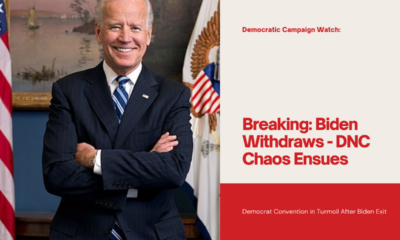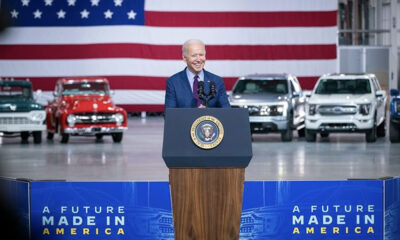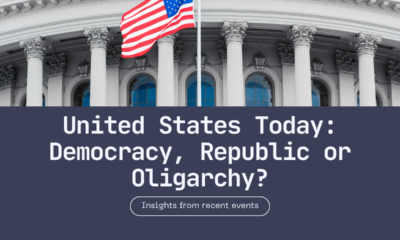Guest Columns
No Labels: Right Diagnosis, Wrong Prescription?
The No Labels organization might have the right idea (or not), but their solution will not work and will instead ensure the status quo.

When the leaders of the Democratic Party, under the guise of “saving democracy,” prop up a doddering 81-year-old incumbent president by banning intra-party debates, manipulating their primary calendar, kicking the opposition party’s frontrunner off the ballot, going after his bank roll and trying to put him in prison – all while demonizing independent candidates and blocking their ballot access – America has a problem. And that’s only on one side.
The Republican Party, meanwhile, is hell-bent on nominating a candidate who didn’t carry a single swing state in 2020 while losing the popular vote by 7 million votes. It’s a verdict the loser didn’t accept, leading to an infamous riot at the U.S. Capitol, a snubbing of the inauguration, and thousands of criminal charges, some against the former president himself. Yet he’s running again, this time refusing to debate any GOP challengers and vowing retribution against any candidate, donor, or rank-and-file Republican unwilling to accept his coronation 10 months before the general election.
Americans desire a better option. Two-thirds of Democrats did not want Joe Biden to seek reelection. About half of GOP voters said the same thing about Donald Trump. Nonetheless, our country is headed for the longest general election campaign in history between two old and polarizing candidates. One Democratic pollster called it “almost a cruel joke.”
Is there any alternative? Some political reformers think so. Their efforts began 14 years ago at a confab of good-government types who gathered in New York City to launch an organization devoted to regenerating America’s putrefied politics. What ailed voters, they proclaimed, was the toxicity of the nation’s two dominant political parties.
These idealists weren’t launching a third party – they were adamant on that point – but instead promoting a better approach to governance, particularly on Capitol Hill. In their Kennedy-esque re-imaginings of the world, civility would replace splenetic posturing; government shutdowns would give way to reasonable budget compromises; ideological purity would take a back seat to sensible pragmatism. This new organization, No Labels, was to be the answer to an increasingly liberal Democrat Party and a Republican Party veering inexorably rightward. No Labels’ mantra was: “Not left. Not right. Forward.”
None of what they outlined was novel. It was how Washington operated for decades after World War II. But in the 21st century, Congress’ collegial muscles had atrophied. No Labels aimed to restore them, with help from a bipartisan congressional alliance, the “Problem Solvers Caucus.”
Solving problems in Washington almost always involves each side giving a little. That was growing more difficult in an environment where ad hominem name-calling was becoming the norm. As it turns out, rhetorical restraint wasn’t just good manners, as the conveners in New York noted. It was a necessary component of a functioning democracy. One of the speakers at that mid-December 2010 rollout was New York Times columnist David Brooks, who called for a “code of gentlemanly behavior” in political discourse. Former Agriculture Secretary Dan Glickman, a moderate Democrat from Kansas, expounded on that theme. “I’m not arguing for fundamental, radical change,” Glickman said. “What I’m arguing for is a grassroots movement for political leaders to reach across the aisle.”
An inability to do so was manifesting itself in destructive ways, not the least of which were the periodic federal government shutdowns becoming commonplace in Washington, along with an addiction to deficit spending by officials in both the legislative and executive branches unwilling to face simple mathematical facts, let alone make tough choices.
“Our future is currently threatened by a range of unsustainable policies and a broken political system,” proclaimed former U.S. Comptroller General David Walker, an advocate of fiscal restraint. “We are here today as founders of a new movement designed to shock that political system in order to get America back on track.”
In the ensuing election cycles, the nation’s leading political institutions did not get back on track. Nor did they merely go off the rails. They jumped the shark.
Capital Follies
Today, insults and incivility, amplified by social media, are daily Capitol Hill fare. Members of Congress are challenged in primaries simply for attempting to work with the other side. Impeachment has become one more partisan campaign tool, along with censure, stripping members of committee assignments, and loose talk about packing the Supreme Court. Presidential debates descended to the level of the Jerry Springer Show.
Burdened with the self-imposed “Hastert rule,” the House of Representatives routinely thwarts the will of the chamber’s majority. (For the uninitiated, the Hastert rule states that a House speaker cannot permit a vote on any bill that doesn’t have the support of a majority in the speaker’s political party – even if it would pass overwhelmingly on a vote by the full House. Undemocratic by definition, it’s named after a serial child molester. You cannot make this stuff up.)
On the Republican side of the aisle, the speaker’s gavel has become an albatross: Two of the three previous Republican speakers have stepped down – and a third was deposed after less than a year when eight renegade right-wingers joined all the Democrats to force Kevin McCarthy out. What made the coup against McCarthy possible was a procedural gimmick even stupider than the Hastert rule: A single member can now call for an up or down vote on retaining the speaker – as Mike Johnson may find out any day.
Government shutdowns are now essentially regularly scheduled events. (The next one is planned for March.) Not that any of them have produced fiscal sanity. The $13 trillion national debt that alarmed David Walker in 2010 more than doubled. The federal deficit was $129 billion in December alone. And though the trillion-dollar deficits of President Obama’s first term in office helped give No Labels its impetus, 2010 was about the time conservatives stopped talking about deficit spending. The old Clinton-era mantra “It’s the economy, stupid” gave way to less manageable ethos: “It’s the culture, stupid.”
Into that cauldron leapt a New York real estate man and reality television star. Donald Trump wowed ’em at the 2011 annual Conservative Political Action Conference by claiming that Barack Obama was an illegitimate president because he was born in Africa, and not Hawaii. Trump also told the crowd he was thinking of running for president. In response, the D.C. establishment turned the annual White House Correspondents’ Association dinner into a roast of Trump, who attended as a guest of The Washington Post.
Trump was irritated, but not dissuaded. Although he grudgingly acknowledged Obama was really born in Hawaii, Trump proved to be someone who feeds off personal provocations. All the lawfare efforts against him have served only to further incentivize him. And contrary to his enemies’ intentions, they have rallied Republican voters to his side.
Bully Pulpit
Once again, however, and notwithstanding the futility of their previous efforts, the optimistic souls at No Labels are offering a solution. The current plan is to field a “unity ticket” – a Democrat with a GOP running mate, or vice versa – presumably comprising two moderates skilled in the art of compromise and civil discourse. No Labels has qualified for the ballot in 14 states and is working toward certification in 18 others. No Labels leadership, primarily founding chairman Joe Lieberman, CEO Nancy Jacobson, and chief strategist Ryan Clancy, vow that they are in it to win the presidency and not be a “spoiler.”
The plan to offer voters in those 32 states a choice other than Biden or Trump comes with a an interesting, and perhaps unworkable, caveat: No Labels leaders have said that if their presence in the 2024 race makes it likely that Trump will regain the White House as a result, they will pull the plug on their effort.
That pre-condition has not mollified Democrats. If anything, it enraged them all the more.
Democratic Party strategists are convinced that Trump has a ceiling of 46% or 47% percent (he got 46.8% in 2020) and if Biden faces him one-on-one, the results would be the same as last time. But they worry that Trump has a floor in the mid-40s and that any third-party candidacy hurts their reelection chances, whether it’s Green Party candidate Jill Stein or independents Cornel West and Robert Kennedy (all three of whom have already declared). Democrats are convinced that even a strong No Labels ticket could never win, but would likely doom Biden.
As a consequence. Biden’s party has mounted a ferocious campaign against No Labels with tactics ranging from personal vitriol and threats against their leaders and donors to legal machinations to keep them off the ballot. The effort is so ham-handed that No Labels filed a formal complaint with the Department of Justice alleging that they are the victims of an illegal conspiracy – that the bullying, harassment, and organized efforts to deny ballot access run afoul of the same federal statute protecting elections that Trump is charged with violating.
Viewed from the outside, “conspiracy” doesn’t seem quite the right word, considering that so much of the effort to stifle and intimidate No Labels is being done in the open. Hypocrisy is a fair description, however, as Joe Lieberman indicated in a Jan. 18 news conference. The efforts to intimidate No Labels, he said, “are no less than an attempt to knock the legs out from under American democracy.”
One can agree with this – most of it is self-evidently true – and still be unpersuaded that No Labels has half the correct answer. Two problems with their approach are apparent.
First, because No Labels is a movement and not really a political party, it doesn’t hold primaries. Its officers are self-selecting, and its presidential ticket would be chosen by fiat and not at the ballot box. Political parties once picked their presidential nominees this way: in “smoke-filled” rooms and via political conventions floor fights. It’s a method that produced giants ranging from Abraham Lincoln to Franklin Roosevelt, but it’s not how modern voters are accustomed to choosing presidential nominees. It would be a hard sell, especially from a group of Washington-based insiders.
Second, these insiders may not be casting a wide enough net. Instead of sounding like a solution to the dreaded Biden-Trump rematch, the names reportedly under consideration (men like Joe Manchin, Larry Hogan, Jon Huntsman, Mitt Romney, Chris Christie, Dean Phillips) illustrate the nature of the problem.
You think Biden and Trump are too old? Manchin and Romney will be 77 by Election Day.
You think Republicans have painted themselves in a corner on the issue of abortion? All those men named above except Phillips – and they are all men, which is another problem – have described themselves as “pro-life.”
Phillips, by the way, just spent millions of dollars advertising in New Hampshire, and didn’t get 20% of the Democratic vote against Biden even though the president’s name wasn’t on the ballot. On the GOP side, Chris Christie didn’t even make it to the starting gate in New Hampshire, despite being the only Republican candidate willing to assail Trump.
There’s little evidence that disaffected voters looking for a better choice as president are hankering for career politicians who could no longer win an election in their own party. Like it or not, U.S. politics is personality driven. Fundamentally decent, capable (but uncharismatic) men like Huntsman, Manchin, and even Gov. Hogan are desperately needed in Congress. But they are not necessarily the kind of candidates who could challenge the established order and win. If you’re knocking down an entrenched system, you’d better expand your thinking – and your pool of candidates.
Insightful Washington Post columnist David Von Drehle recently floated the idea of actor Dwayne Johnson – “The Rock” – as presidential timber. That’s more along the lines of where the 40% of Americans who eschew the Democrat or Republican Party are. Others have touted Matthew McConaughey. Flashy 47-year-old bisexual Sen. Kyrsten Sinema fits the zeitgeist much better than her compadre Joe Manchin. And since no major party ticket should ever again feature two old white males, Sinema figures to be on any third-party ticket’s veep shortlist.
Nikki Haley or Liz Cheney are intriguing, although their “NeverTrump” personas would likely – and ironically – help The Donald in a three-way race. Another woman who merits consideration might not: Condoleezza Rice is perhaps the most accomplished African American woman in U.S. history. Currently running the Hoover Institution at Stanford University, she recently turned 69, but looks younger and has brains and star power to burn.
Hollywood Endings
Many years ago, when Ronald Reagan was in the White House, Patrick Caddell was busy dreaming about the perfect presidential candidate. Caddell had been Jimmy Carter’s pollster and adviser so he was thinking of a Democrat when he created a fictional candidate, “Sen. Smith,” who he used in polls to assess what kind of candidate might recapture the hearts of Democratic voters.
“Sen. Smith,” who was in his 40s, had been in the Senate for about a decade and was uncorruptible, moderately liberal, and passionate about the concept of shared sacrifice. He was an amalgamation of John F. Kennedy, Caddell’s boyhood idol, and Frank Capra’s incorruptible lead character Jefferson Smith in the 1939 Hollywood classic “Mr. Smith Goes to Washington,” starring real-life war hero (and Oscar winner) James Stewart.
It was a bit of a rigged game, yes, but “Sen. Smith” polled very well. He still did in 2020, when Greg Orman, a Kansas independent who gave the establishment a scare in his 2014 Senate race, commissioned an updated version of Pat Caddell’s old survey.
I’m confident Smith would still poll well today. But Jefferson Smiths don’t come along every day. They are as rare as the great Jimmy Stewart (and his friend Ronald Reagan). Moreover, candidates like Sen. Smith don’t come out of either of today’s two major political parties. The Democratic Party and the Republican Party are organized in ways designed to prevent just such an upstart from emerging. So to beat the system, you may have to look outside it.
This article was originally published by RealClearPolitics and made available via RealClearWire.
Carl M. Cannon is the Washington Bureau Chief of RealClearPolitics and Executive Editor of RealClear Media Group. Carl is a past recipient of the Gerald R. Ford Journalism Prize for Distinguished Reporting and the Aldo Beckman Award, the two most prestigious awards for White House coverage. Previous positions include executive editor of PoliticsDaily.com, D.C. bureau chief for Reader's Digest and White House correspondent for both the Baltimore Sun and National Journal. He was a 2007 fellow-in-residence at Harvard University's Institute of Politics, a past president of the White House Correspondents’ Association, and is a published author.
-

 Executive4 days ago
Executive4 days agoSecret Service chief gets no solace
-

 Civilization5 days ago
Civilization5 days agoBiden drops out of race
-

 Executive2 days ago
Executive2 days agoWaste of the Day: Louisville Taxpayers Pay Nearly $600,000 For Empty Building’s Maintenance, Security
-

 Guest Columns4 days ago
Guest Columns4 days agoFear Itself: Democrats’ Favorite Strategy Caused Their Current Chaos
-

 Executive3 days ago
Executive3 days agoWhere is Joe Biden – or Jill?
-

 Executive1 day ago
Executive1 day agoWaste of the Day: Throwback Thursday: Cities Used Crime Prevention Funds on Soccer Games, Paper Shredding
-

 Civilization4 days ago
Civilization4 days agoBuild Iron Dome in the United States To Prepare for Israel’s Worst Day
-

 Executive2 days ago
Executive2 days agoFacile and politically motivated suggestions














